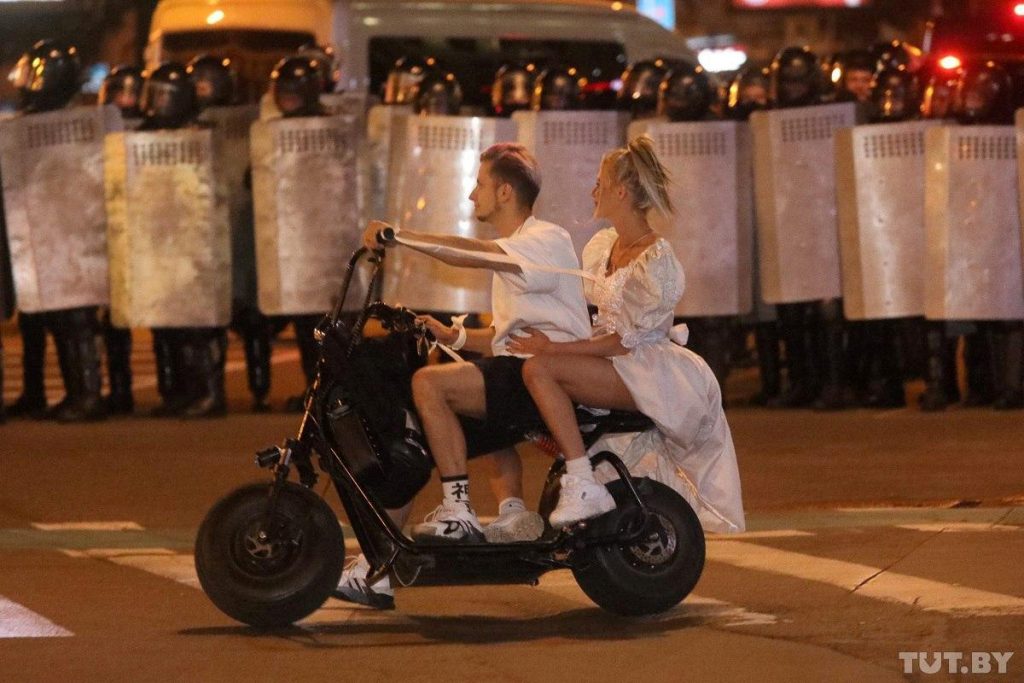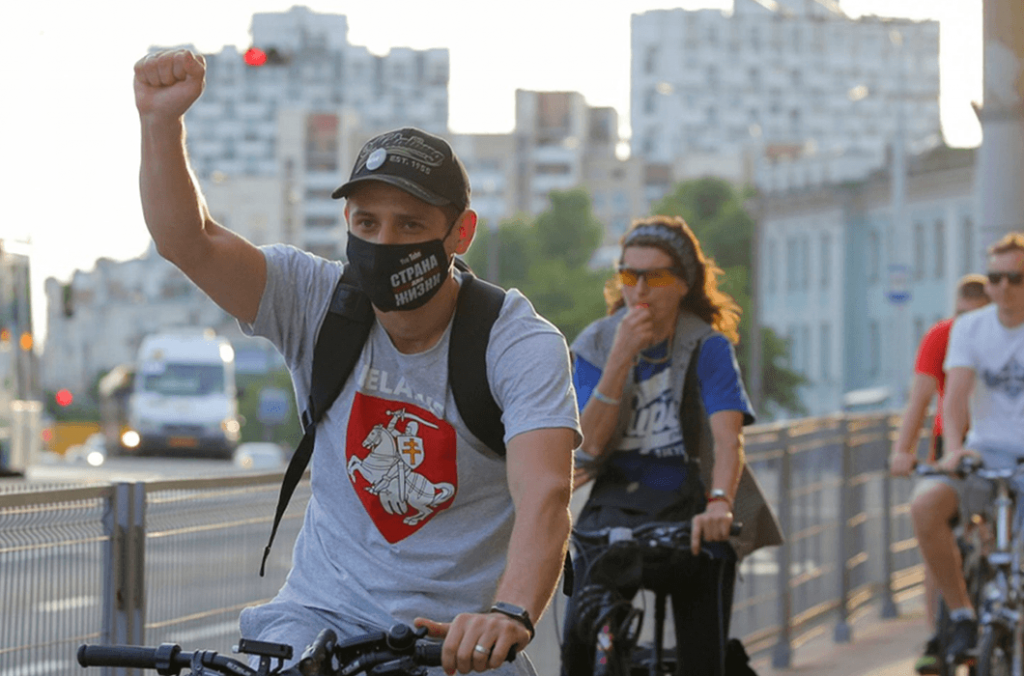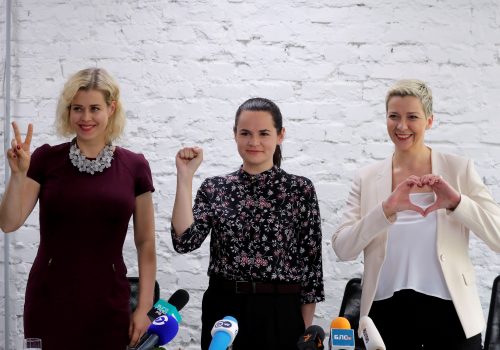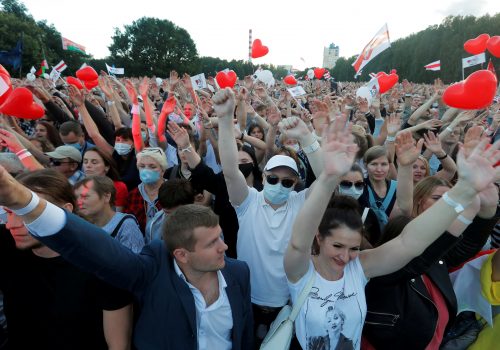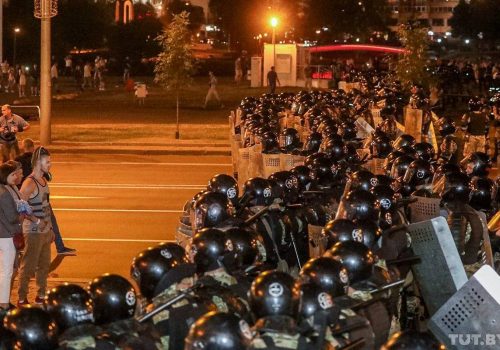Belarusian President Alyaksandr Lukashenka was in defiant mood on August 10, one day after a deeply flawed presidential election sparked unprecedented scenes of mass protest in towns and cities across the country. Nevertheless, his bluster cannot disguise the fact that Belarus is now at a crossroads in its modern history.
Official election results handed a landslide victory to Lukashenka, who has been in power since 1994 and is often referred to as “Europe’s last dictator.” However, the vote was marred by allegations of widespread fraud. These suspicions appeared to be confirmed by data from a limited number of polling stations that broke ranks with the government and identified opposition candidate Svyatlana Tsikhanouskaya as the clear winner.
With massive falsification of the election results widely anticipated, protesters began to gather across Belarus as polls closed on Sunday evening. Violent clashes continued into the night, with thousands arrested amid a large-scale nationwide deployment of the Belarusian security forces and military units.
Lukashenka came out fighting on Monday, claiming victory in the election and branding protesters as “sheep” while blaming the unrest on foreign interference. In reality, Sunday night’s dramatic scenes were the latest indication of a democratic awakening that has gripped Belarus since the start of the presidential campaign in spring 2020.
Factors driving this newfound political engagement include frustration at the country’s stagnating economy and growing demands for change after 26 years of Lukashenka. The Belarusian strongman’s buffoonish handling of the coronavirus crisis, which saw him claim that vodka, sauna visits, and tractor rides could help ward off the pandemic, have led to further public dissatisfaction with the long-serving dictator.
Lukashenka began this year’s election campaign in typical fashion by jailing or otherwise sidelining his potential rivals. He then miscalculated in allowing Svyatlana Tsikhanouskaya to register as a candidate. The wife of a blogger and potential presidential candidate who had been imprisoned during the early stages of the campaign, Tsikhanouskaya came across as a reluctant and unlikely candidate.
The authorities appear to have regarded her as a harmless figure who could lend the election a degree of democratic credibility without posing a genuine threat to the incumbent. Instead, she has proven far more formidable than anticipated, unifying the country’s democratic opposition and drawing record crowds to a series of campaign rallies across the country that energized the Belarusian public in the weeks leading up to the August 9 vote.
Tsikhanouskaya is now the figurehead of a nationwide movement for change. On August 10, she rejected the official presidential election results and called for talks with the authorities over a peaceful transfer of power.
Protests are expected to continue in the coming days, while there is also talk of a national general strike. Given the scale of public engagement in the Tsikhanouskaya campaign and the number of Belarusians who appear to have voted for her, opposition to a sixth term for Lukashenka is unlikely to disappear in the near future. This raises the prospect of further bloodshed as the regime increasingly relies on force to quell the unrest.
Geopolitically, the current crackdown on the country’s pro-democracy opposition leaves Belarus potentially more isolated than ever. While international condemnation has so far been fairly muted, it is noteworthy that the only messages of congratulation have come from authoritarian regimes such as Russia, China, Azerbaijan, and Uzbekistan.
Furthermore, Vladimir Putin’s congratulations were accompanied by a strong hint that continued Kremlin support will depend on Belarus’s deeper integration into Russia. “I hope your state activity will facilitate mutually beneficial Russian-Belarusian relations in all areas, deepen cooperation within the Union State, and build up integration processes,” the Russian leader commented.
The current confrontation represents the greatest challenge to Alyaksandr Lukashenka in over a quarter of a century and may still only be in its early stages. As events continue to unfold, the Atlantic Council invited a series of experts to share their thoughts on the potential implications of the crisis for the future of Belarus.
Daniel Fried, Distinguished Fellow, Atlantic Council: Although events are moving fast in Belarus, it’s not hard to discern the challenge that Europe and the US face in thinking through their policy options. For years, the European Union, United States, and European governments most concerned with Belarus (especially Poland and Sweden) have struggled, moving between pressure against and engagement with Belarus President Lukashenka. Neither has worked. With Western interlocutors, Lukashenka has made the case that he is committed to maintaining Belarus’s independence from Moscow, capturing some Western support. But he has done little to build enough support at home to rule without, as it turns out, gross fraud and violence. It’s a bit like former President Viktor Yanukovych in Ukraine, who failed to steal an election in 2004 (triggering the Orange Revolution) and used violence against pro-European demonstrators in 2013 (triggering the Euromaidan Revolution and his final overthrow).
What do we do now?
The dilemma is the same: too much pressure and we risk Lukashenka relying on Putin for protection and Belarus losing its sovereignty. Too much accommodation and we risk letting a dictator set the terms of our engagement. In fact, the people of Belarus have changed the terms of the Western discussion. If, as seems likely, Belarusian society will not accept massive fraud and violence against them, neither should we. The regime might fall rapidly, as in Ukraine. But we must not count on that; whatever the accusations of Putin and his propaganda apparatus, the US did not create or control the Maidan, and the pace and extent of the current protests is not the West’s to command. Things may move fast in Belarus, but our policy needs to be sustainable for a longer term.
Starting now, we need to make clear where we stand. The US and EU need to call out the fraud and violence for what it is. Second, we need to support the democratic opposition over the long term. Europe and the US have a lot of experience with that in other contexts: support for independent journalism both in and of Belarus, support for activists, and long-term outreach to civil society generally, some of this official and much carried by non-governmental civil society. Third, we need, if we can, to maintain an official presence in Belarus and maintain dialogue with the regime, as we did during Martial Law Poland. Sanctions also should be on the table, especially against individuals responsible for violence and repression. The US and Europe cannot determine the course of Belarusian history. But we can, perhaps, help frame the context in which the Belarusian people make it.
Hanna Liubakova, Belarusian Journalist, Outriders: What happened on August 9 felt like the darkest day in the history of modern Belarus, but it might mark the beginning of a new era for the country. Lukashenka has shown that he is ready to rely on force and deceit to a degree that was previously unimaginable. According to state media, the protesters on Sunday evening were all intoxicated hooligans. In reality, I saw peaceful crowds of mostly young people chanting “police are with the people” in an attempt to persuade the security services not to attack them. Blaming the opposition movement on foreigners is also unconvincing. Since protests took place in at least 30 cities, it will be hard to persuade the Belarusian public that the participants were provocateurs led from abroad. In recent weeks, I have seen thousands upon thousands of people attending opposition candidate Svyatlana Tsikhanouskaya’s rallies all over Belarus. These people already feel that they are the new majority in the country, and they are demanding change. The police can always suppress individual protests, but other forms of dissent will continue. In the face of blatant injustice, people will try to defend themselves and their rights. Lukashenka may have been officially declared the winner, but he is now on shaky ground.
Damon Wilson, Executive Vice President, Atlantic Council: The people of Belarus have had enough. In the lead up to Sunday’s election (in which leading candidates were jailed or fled the country), they turned out in unprecedented numbers to back Svyatlana Tsikhanouskaya’s unlikely bid. This teacher and mother of two captured the ethos of the electorate: “I’m tired of putting up with it. I’m tired of being silent. I’m tired of being afraid.” Turns out many Belarusians are no longer afraid. Protesters embracing nonviolent civil resistance have put President Lukashenka on his back foot. As someone who cast himself as a man of the people, twenty-six years in office has ruined that image. During his rule, Lukashenka mastered playing off East against West to maximize his room for maneuver. He embraced Putin sufficiently, promising but never delivering on the Union State with Russia, helping to maintain the Belarusian economy, while courting Europeans and Americans keen to see Belarus remain an independent, sovereign state. It has been clear that Lukashenka would never lead his nation towards European integration, but he might just prevent it from becoming part of Russia. He now faces his toughest challenge as protest actions escalate across the country. Successful nonviolent movements require unity, planning, and discipline. With these, the opposition can increase popular participation in acts of civil resistance, diminish the impact of repression, and welcome defections from state services. Lukashenka’s decisions over the coming hours and days will shape whether he is seen as an illegitimate dictator who spilled blood and has no recourse but isolation and domination by Moscow. Alternatively, he can show his own patriotism by having the courage to accept the wishes of his people and transfer power with a legacy of having kept Belarus independent.
Nicolai Khalezin, Co-Founding Artistic Director, Belarus Free Theatre: The evening of August 9 was a turning point in the modern history of Belarus. The reason for this is not the use of overwhelming force against demonstrators who were trying to peacefully defend their right to free elections. Nor is it the fact that some members of the security forces and election commissions refused to carry out criminal orders. It was historic because the protesters have a new vision for the nation. This was not a protest in support of any specific politicians or political parties. This was a movement demanding fundamental reform in every sphere of the country’s life. In this sense, the protest movement is closer to the Hong Kong model than the traditional Eastern European protest model, where political leaders have typically led the masses. The protests currently taking place in Belarus are driven by small localized groups with a strong emphasis on creativity and nonviolent resistance. The authorities have great difficulty dealing with this approach, as their past experience has focused on detaining political leaders. This has led to the current situation, with mass arrests but no sign of an end to the protests. It is also worth dwelling on who is protesting. Many are young Belarusians, and a significant percentage are IT professionals or entrepreneurs, leading to smart and innovative approaches to protesting and dynamic responses to a rapidly changing situation. The lack of clear leadership makes it very difficult to predict the outcome of the current confrontation, but it is already obvious that the situation in Belarus will never return to the status quo of two or three months ago. We can say with some degree of confidence that the transition of power has already begun in the country, but it remains unclear how long this generational shift will actually take.
Melinda Haring, Deputy Director, Eurasia Center, Atlantic Council: Belarus is a mess, but Lukashenka’s long grip on power is far from over. While he had to steal the election with jaw-dropping fraud and protests have broken out across the country, it’s too soon to compare the situation to the Euromaidan in Ukraine. The motivations may be similar, but Belarus has proven resistant to the same cycles which have pushed dictators out in neighboring states. The police state in Belarus is far stronger than in Ukraine, and civil society and the free media are weaker. Sadly, I expect the same old cycle we’ve seen countless times before in Belarus: massive fraud, violence, and tepid initial Western denunciation followed by total silence. I hope I’m wrong, but I fear we’re looking at five more years of dictatorship in Belarus.
Anders Åslund, Senior Fellow, Atlantic Council: Alyaksandr Lukashenka and his late-Soviet regime seem obsolete and exhausted. The election on August 9 appears to have been a devastating blow to Lukashenka. The official Belarusian exit poll gave Lukashenka 79.7% of the votes and opposition candidate Svyatlana Tsikhanouskaya only 6.8%. By contrast, an independent exit poll more credibly recorded 69.7% of the votes for Tsikhanouskaya and only 16.3% for Lukashenka. It is therefore possible to talk about the election as one of the most rigged votes in recent times, leaving Lukashenka without legitimacy. For the past two months, Belarus has seen big public opposition rallies in all of the country’s major cities. As expected, people again came out in large numbers on Sunday evening to protest against the government’s efforts to falsify the election result. The subsequent clampdown on protesters was particularly heavy-handed in Minsk but seems to have been less thorough elsewhere. A first political strike at a major steelworks was reported on Monday. More mass protest actions are likely, including a possible national strike. It is doubtful that Lukashenka will survive them. Speaking with typical bravado on Monday, he referred to the election as a “holiday” and accused the opposition of seeking to spoil it. In reality, he has little to celebrate.
Francisak Viacorka, Belarusian Journalist, Digital Communication Network: Lukashenka is facing a crisis of legitimacy. He realizes that the majority is not on his side and he can only rely on the security services, who have been given a free hand. Lukashenka wants to crack down on opposition protests as he did in 2010. However, the scale of public disappointment back then was far lower than it is today. Now that police have begun shooting peaceful protesters, there is no way back. Meanwhile, the lack of Western reaction could lead to further dangerous escalations. Currently, the protest movement is broadly pro-democratic, pro-Western, and anti-Russian in character. However, this doesn’t mean that Russia will not seek to take advantage of the situation if things deteriorate further.
Jonathan Katz, Senior Fellow, Frontlines of Democracy Initiative, German Marshall Fund of the United States: The post-election protests we are seeing across Belarus following President Lukashenka’s clear manipulation of votes on August 9 is an unmistakable signal by Belarusians that they seek democracy, leadership change, and a new direction for their country. There are several factors that led to these political circumstances, including Lukashenka’s autocratic leadership, along with his irresponsible and bizarre response to the deadly coronavirus pandemic. This is an extremely dangerous moment for Belarusians. Lukashenka knows he has lost Belarusians and protests will persist long-term. It is likely he will resort to greater repression and violence in order to cling to power and attempt to silence dissent. In the last decade alone, we have seen too often the damage, carnage, and far-reaching consequences when desperate authoritarians cling to power at all costs. An international response is needed immediately to ensure this violent outcome does not occur in Belarus. The US, EU, and others in the international community must move quickly to condemn Lukashenka and urge an end to the violence taking place in Belarus. International powers must urge Minsk to hold free, fair, and credible elections and clarify that new punitive US and EU measures to hold Lukashenka accountable are on the table. Lukashenka is betting that distracted and disinterested Western powers will not respond beyond statements. What comes next in Belarus not only has ramifications for millions of Belarusians but also for the wider neighborhood and the security and prosperity of the transatlantic community.
Peter Dickinson is the Editor of the Atlantic Council’s UkraineAlert Blog.
Further reading
The views expressed in UkraineAlert are solely those of the authors and do not necessarily reflect the views of the Atlantic Council, its staff, or its supporters.


The Eurasia Center’s mission is to enhance transatlantic cooperation in promoting stability, democratic values and prosperity in Eurasia, from Eastern Europe and Turkey in the West to the Caucasus, Russia and Central Asia in the East.
Follow us on social media
and support our work
Image: A couple rides a scooter past riot police in Minsk during an August 9 crackdown on protests over the falsification of the Belarusian presidential election. Dmitry Brushko/Tut.By via REUTERS
